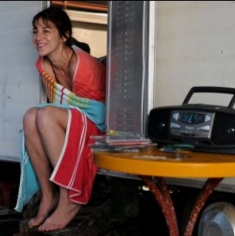The credits for Julie Bertucelli’s film L’Arbre (The Tree) note that assistant director Frederick Nicolas found the Morten Bay Fig tree featured in the film, and with just cause: the visual presence of the tree expresses the force of nature in the film – bestowing beauty and destruction, with equal munificence. The film was screened at the Haifa International Film Festival 2010 in the presence of Bertucelli and Yael Fogiel, one of the film’s co-producers.
The tree was the starting point for Bertucelli’s journey with this project which eventually led her to Judy Pascoe’s novel Our Father Who Art in the Tree, which tells the story of Dawn O’Neill, a young widow with four children, living outside a small town in Queensland, Australia. The mother and children each respond to the loss in their own way, with eight year old Simone coming to believe that her father speaks to her through the giant tree in their yard.
Bertucelli’s deftly avoids all the pitfalls inherent in dealing with the over-arching themes of death, loss and nature. Eschewing sentimentality and grand statements, the film concentrates on the specifics, letting the story emerge through the characters, moment by moment. Rather than presenting a clichéd image of the young, beautiful grieving widow and devoted mother, Dawn is revealed in all her weakness and strength, without any attempt to gloss over her flaws and mistakes. Charlotte Gainsbourg is by turns numbed by grief, a sympathetic confidant to her children, a negligent mother, fun-loving, flirtatious, helpless and resourceful, hesitant and impulsive; creating a complex and compelling portrait of a woman whose life has been irrevocably altered.
In a similar manner, Bertucelli situates the human story in the context of the Australian landscape without hyperbole, resisting the temptation to present nature as a visual reflection of human emotion. Nature is not just a glowing sunset and a vast expanse of open sky, nature is also bats in the kitchen and frogs in the toilet. Bertucelli lets the tree speak for itself, as it were, from the ants circling the roots, to the sound of wind blowing through the branches, the sunlight filtered through the leaves and the roots pushing up through the concrete. It is a powerful and compelling presence in the film.
The relationship between people and nature in the film is an encounter between living entities, at times nurturing one another, at times competing for survival. Simone turns to the tree for comfort, creating a small shrine to her father high in its branches, one brother homes in on the tree via Google earth, while the other is just trying to get away – as far and as fast as possible, while their mother tries to find a way to move on without severing her roots.
Just as nature is not sentimentalized, the role of fantasy and imagination is neither trivialized nor elevated to mythic stature by the film. Simone (beautifully and convincingly portrayed by Morgana Davies) and her friend play a game fantasizing about their lives as teenagers aged 15 and 18. The game of imagining herself at age 18 travelling to France to meet her mother’s family is also a way for Simone to envision a future where all the options are open.
The film does not attempt to prove or disprove Simone’s belief that her father talks to her through the tree. Instead, the focus is on the impact of this belief on Simone and her family, a reflection on the power of belief (or imagination, if you will) as a source of strength and emotional sustenance, and its limitations. L’Arbre will be released in Israel by Shapira Films on September 30, 2010. TV5 Monde, which promotes French language, culture and films – such as L’Arbre, is one of the sponsors of Haifa IFF 2010.
L’Arbre (The Tree) directed by Julie Bertucelli
France/Australia 2010, 101 min., English with Hebrew subtitles
AYELET DEKEL






